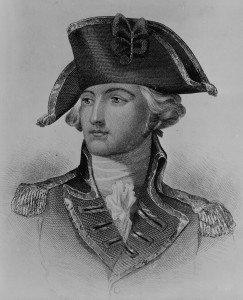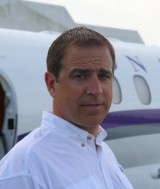By Chris Brady
 In June of 1777, flamboyant General “gentleman Johhny” Burgoyne initiated his attack on the colonies from Canada.
In June of 1777, flamboyant General “gentleman Johhny” Burgoyne initiated his attack on the colonies from Canada.
He commanded over seven thousand infantrymen, a combination of British redcoats and Hessian mercenaries, a small army of artillery specialists and 138 cannon, 400 Native Americans, and some Canadians and colonial Tories.
Burgoyne was not satisfied with the attacking power of his military force, however, for in addition to it, he let loose a barrage of negative press.
Chief among his efforts was a proclamation issued on June 23 in which Burgoyne
“accused the leaders of the ‘unnatural Rebellion’ of perpetrating ‘Arbitrary Imprisonments, Confiscation of Property, Persecution and Torture . . . without Distinction of Age or Sex, for the sole Crime . . . of having adhered in Principle to the Government under which they were born.
“And if the ‘Phrenzy and Hostility should remain, I trust I shall stand acquitted in the Eyes of God and Men in denouncing and executing the Vengeance of the State against the willful Outcast.'”
Despite his blowhard style, the threats and the condemnations, despite his bragging that he could command the “Vengeance of the State,” Burgoyne was utterly defeated and ended up surrendering his entire army.
He failed on many accounts, and he was aided in his failure by the decision of General Howe not to march to his aid.
But although Burgoyne is generally acclaimed as a decent soldier, historians are largely in agreement that he was not a good leader.
His arrogance on topics in which he was not an expert (though he assumed himself to be), were the seeds of his undoing. Burgoyne totally underestimated the time and toil required to march a large army through the wilderness, and he missed entirely the strategies of battles in the woods and hills.
He also failed to properly grasp the complexities of dealing with his Native American allies, and this was partly responsible for their desertion of him at an inopportune moment.
Finally, Burgoyne made a beginner’s mistake and violated the basic rule of engagement to never divide one’s force in the face of an enemy, and split his into three.
Although bold, brave and persevering, Burgoyne’s weaknesses were too great to overcome. He lead a brave fight, but cost England dearly.
The combination of Howe’s refusal to coordinate strategy with Burgoyne’s attack and Burgoyne’s own mistakes and false assumptions resulted in an enormous defeat that shocked Europe.
The timely news resulted in increased French involvement in the colonial cause, and a continuing drain on resources and supplies for the English.
Reading Burgoyne’s proclamation of June 23 is almost laughable now.
The pages of history are littered with individuals who assumed too much about their own competence and then cost their causes, companies, or armies enormously as a result.
But great leaders are humble creatures. They “know that they don’t know,” and they spend their lives learning and growing and asking and seeking. Great leaders are slow to beat their chests and slow to threaten.
Great leaders are all about love, caring, compassion, commitment, and cause.
In the words of theologian Stuart W. Scott,
“The qualities that one must strongly possess in order to carry out a leadership role are wisdom, initiative, decisiveness, humility, courage, and personal involvement.”
Try to imagine an effective leader who is deficient in even one of these categories. Impossible.
In the case of Burgoyne in the wilderness, he was strongly lacking in two: humility and wisdom. Curiously, he was quite certain of his own wisdom, thereby failing in the humility category as a result. This was his and his army’s undoing. And ultimately, it lead to the failure of England’s iron-fisted rule in the colonies.
*******************************
 Chris Brady co-authored the New York Times, Wall Street Journal, Business Weekly, USA Today, and Money Magazine best-seller Launching a Leadership Revolution.
Chris Brady co-authored the New York Times, Wall Street Journal, Business Weekly, USA Today, and Money Magazine best-seller Launching a Leadership Revolution.
He is also in the World’s Top 30 Leadership Gurus and among the Top 100 Authors to Follow on Twitter. He has spoken to audiences of thousands around the world about leadership, freedom, and success.
Mr. Brady contributes regularly to Networking Times magazine, and has been featured in special publications of Success and Success at Home. He also blogs regularly at Chris Brady.
He is an avid motorized adventurer, pilot, world traveler, humorist, community builder, soccer fan, and dad.






Speak Your Mind
You must be logged in to post a comment.